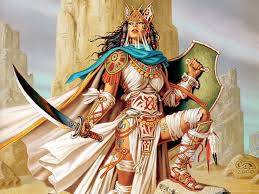Most expansions can't pinpoint a not so stellar reception on a mechanic: But Odyssey can
In the fall of 2001, Odyssey became the latest Magic: The Gathering expansion. Kicking off an entirely new block, the expansion also had the tough job of getting players back into the Magic fold only weeks after the September 11th attacks. The new plane also offered a lot of new storylines, creatures, and other pluses.
However, Odyssey fared much like the ship from Homer's saga - poorly. It had a mixed reception, and thus, sales lagged a bit. But why?
Besides being released during a tough time, there were a multitude of factors. The mechanical theme of the deck wasn't for all players, with many wondering why such an expansion came out so soon after Invasion, which visited similar themes. Others complained that it was too powerful, comparing it to the Urza's block. Still others said it was blue heavy.

But the biggest complaint came from how it utilized the graveyard. Odyssey became the first expansion to make it into a key part of the game to the extent that a LOT of cards carried over discard mechanics. While more experienced players liked this, and developers loved it, there was a problem with it: less experienced players, and more critically, newer players. They wanted to play the cards, and not having to keep put them in the graveyard and NOT play them. While it was a hit in playtesting, most players they found out kinda hated it.
Years later, Mark Rosewater reflected on it, admitting that it was a bad call to force players to do something they didn't want to do so often.
"When the set came out, I discovered that most players weren't enjoying our little "card advantage turned on its head" theme," said Rosewater in 2023. "Yes, there were high-level players who could appreciate it, but most players didn't want to do the things the set was encouraging them to do. They didn't enjoy discarding their card to give first strike to a creature that didn't need it. They didn't want to discard their cards; they wanted to play their cards. And so, the set did poorly.

"This became one of the most important lessons I've ever learned as a game designer: players must enjoy the things you're asking them to do. Magic is a game. People play it because it's fun. When you set up your game so that it forces players to do something they don't want to do, you're doing them a disservice as a game designer. It's fine to break rules if doing so provides a better game experience. Breaking rules just to break them is bad game design."
Since Odyssey, Wizards of the Coast has been more careful about playtests. Not only are they more aware of graveyard discard cards (say that three times fast), but they know not to make an expansion "for the developers" and to keep new players in the loop.
Even decades later, Odyssey still carries that reputation with it, although it has found a second wind of being a popular chaos draft booster as it truly gives some chaos.








